Management and Operations Analysis: Nestle's Leadership and Approaches
VerifiedAdded on 2023/01/12
|12
|3290
|65
Report
AI Summary
This report provides a comprehensive analysis of leadership and management practices within Nestle, a global food and beverage company. It begins by differentiating between the roles and characteristics of managers and leaders, highlighting the importance of communication, decision-making, and employee guidance. The report then explores how leadership and management approaches vary depending on operational situations, particularly focusing on strategies to increase brand value and reputation. Different leadership approaches, including system, situational, and contingency leadership, are examined, emphasizing their impact on team handling and organizational outcomes. Furthermore, the report delves into key approaches to operations management, such as Total Quality Management (TQM), Just-in-Time (JIT) production, and lean production, illustrating their roles in improving product quality, reducing waste, and enhancing efficiency. The final section underscores the value and importance of operations management in achieving competitive advantages, increasing customer bases, and improving production quality within Nestle. The report concludes with a discussion of the factors of the business environment.
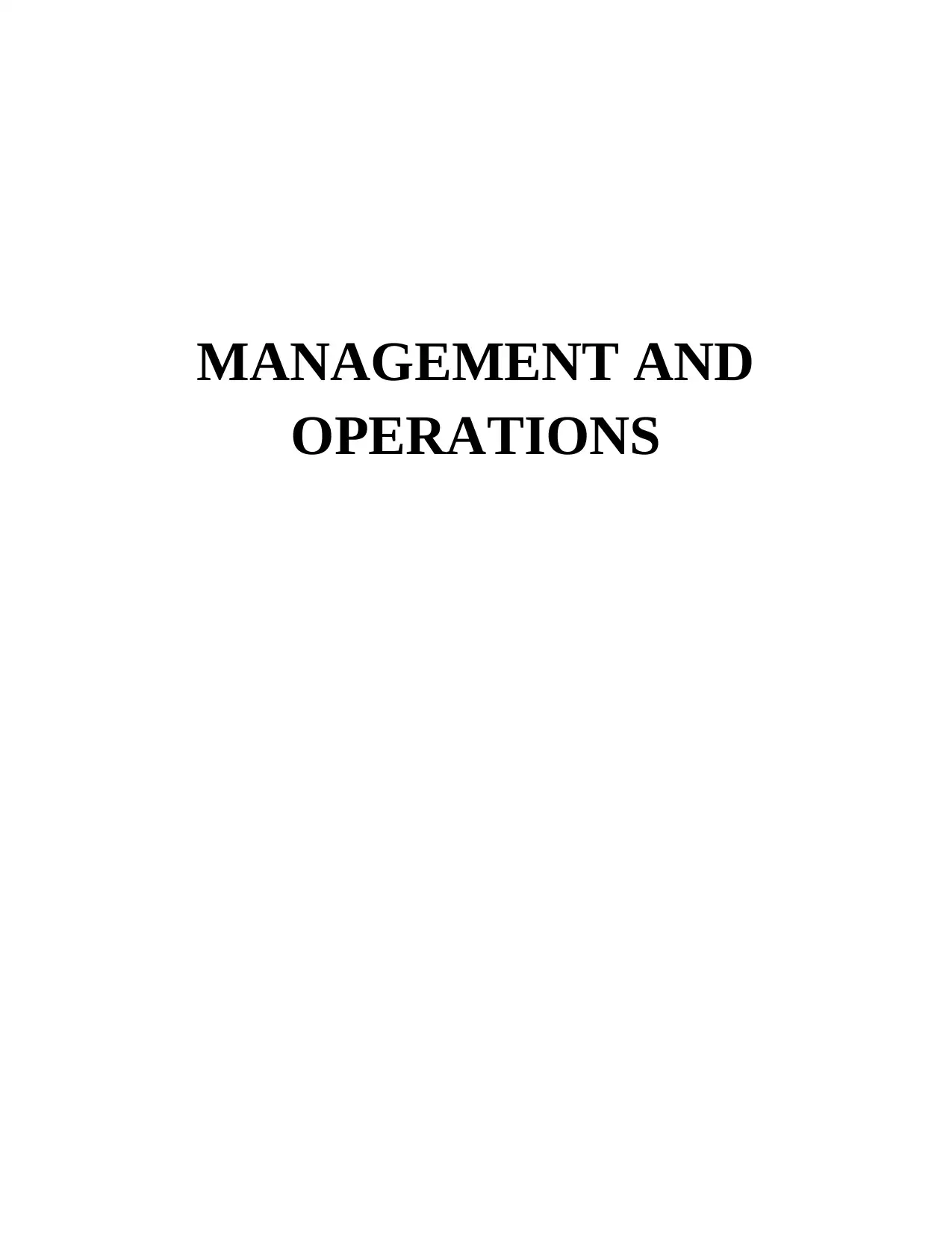
MANAGEMENT AND
OPERATIONS
OPERATIONS
Paraphrase This Document
Need a fresh take? Get an instant paraphrase of this document with our AI Paraphraser
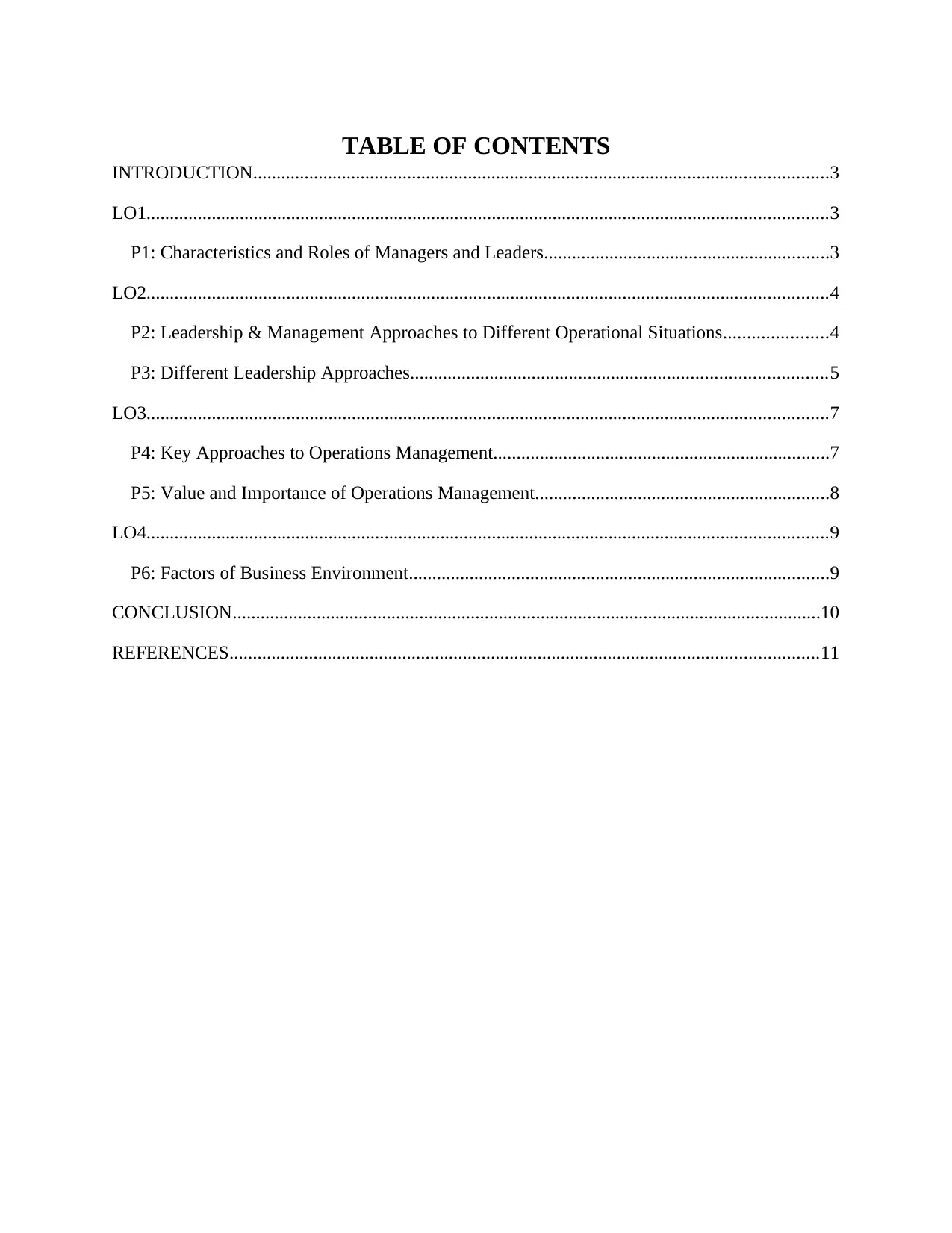
TABLE OF CONTENTS
INTRODUCTION...........................................................................................................................3
LO1..................................................................................................................................................3
P1: Characteristics and Roles of Managers and Leaders.............................................................3
LO2..................................................................................................................................................4
P2: Leadership & Management Approaches to Different Operational Situations......................4
P3: Different Leadership Approaches.........................................................................................5
LO3..................................................................................................................................................7
P4: Key Approaches to Operations Management........................................................................7
P5: Value and Importance of Operations Management...............................................................8
LO4..................................................................................................................................................9
P6: Factors of Business Environment..........................................................................................9
CONCLUSION..............................................................................................................................10
REFERENCES..............................................................................................................................11
INTRODUCTION...........................................................................................................................3
LO1..................................................................................................................................................3
P1: Characteristics and Roles of Managers and Leaders.............................................................3
LO2..................................................................................................................................................4
P2: Leadership & Management Approaches to Different Operational Situations......................4
P3: Different Leadership Approaches.........................................................................................5
LO3..................................................................................................................................................7
P4: Key Approaches to Operations Management........................................................................7
P5: Value and Importance of Operations Management...............................................................8
LO4..................................................................................................................................................9
P6: Factors of Business Environment..........................................................................................9
CONCLUSION..............................................................................................................................10
REFERENCES..............................................................................................................................11
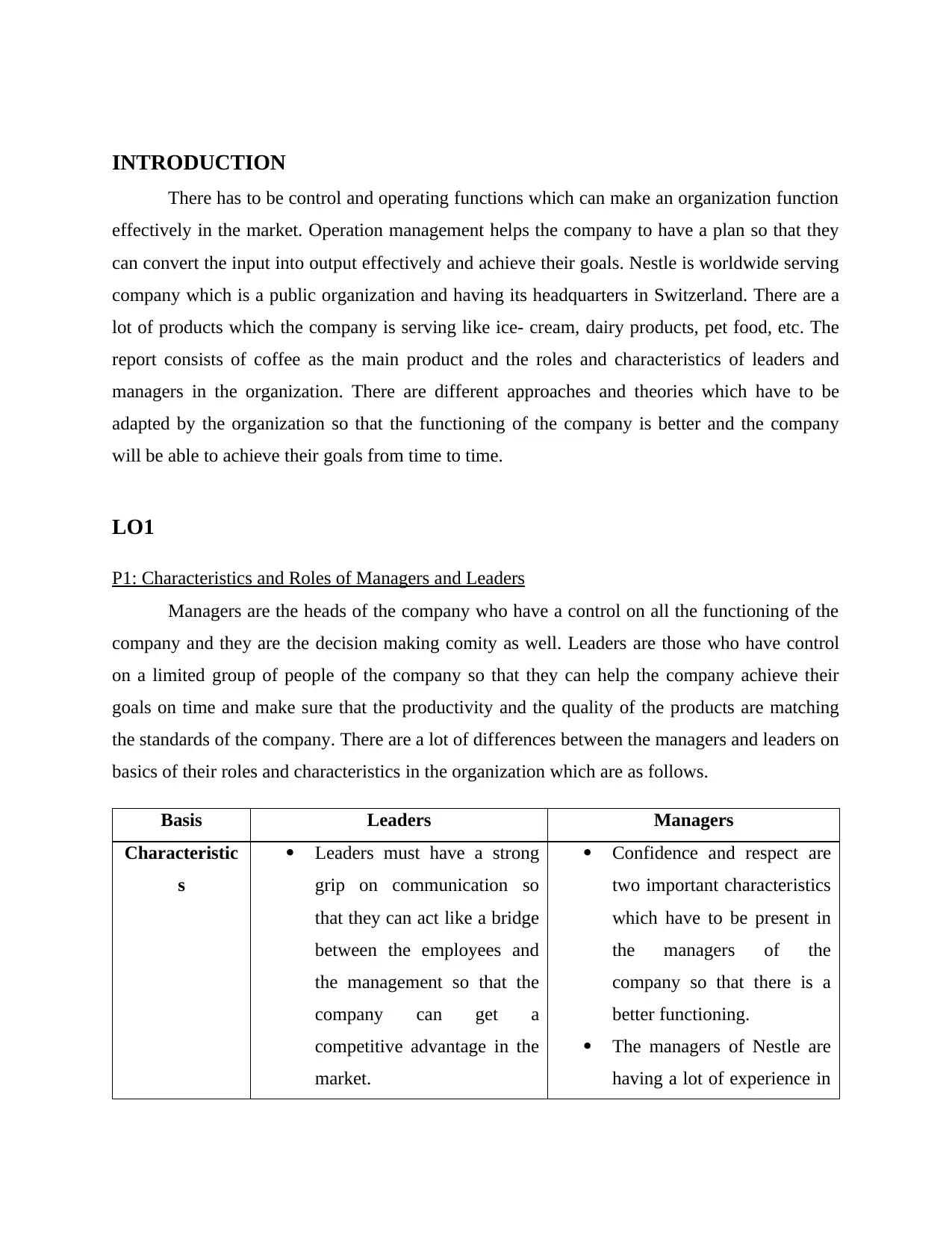
INTRODUCTION
There has to be control and operating functions which can make an organization function
effectively in the market. Operation management helps the company to have a plan so that they
can convert the input into output effectively and achieve their goals. Nestle is worldwide serving
company which is a public organization and having its headquarters in Switzerland. There are a
lot of products which the company is serving like ice- cream, dairy products, pet food, etc. The
report consists of coffee as the main product and the roles and characteristics of leaders and
managers in the organization. There are different approaches and theories which have to be
adapted by the organization so that the functioning of the company is better and the company
will be able to achieve their goals from time to time.
LO1
P1: Characteristics and Roles of Managers and Leaders
Managers are the heads of the company who have a control on all the functioning of the
company and they are the decision making comity as well. Leaders are those who have control
on a limited group of people of the company so that they can help the company achieve their
goals on time and make sure that the productivity and the quality of the products are matching
the standards of the company. There are a lot of differences between the managers and leaders on
basics of their roles and characteristics in the organization which are as follows.
Basis Leaders Managers
Characteristic
s
Leaders must have a strong
grip on communication so
that they can act like a bridge
between the employees and
the management so that the
company can get a
competitive advantage in the
market.
Confidence and respect are
two important characteristics
which have to be present in
the managers of the
company so that there is a
better functioning.
The managers of Nestle are
having a lot of experience in
There has to be control and operating functions which can make an organization function
effectively in the market. Operation management helps the company to have a plan so that they
can convert the input into output effectively and achieve their goals. Nestle is worldwide serving
company which is a public organization and having its headquarters in Switzerland. There are a
lot of products which the company is serving like ice- cream, dairy products, pet food, etc. The
report consists of coffee as the main product and the roles and characteristics of leaders and
managers in the organization. There are different approaches and theories which have to be
adapted by the organization so that the functioning of the company is better and the company
will be able to achieve their goals from time to time.
LO1
P1: Characteristics and Roles of Managers and Leaders
Managers are the heads of the company who have a control on all the functioning of the
company and they are the decision making comity as well. Leaders are those who have control
on a limited group of people of the company so that they can help the company achieve their
goals on time and make sure that the productivity and the quality of the products are matching
the standards of the company. There are a lot of differences between the managers and leaders on
basics of their roles and characteristics in the organization which are as follows.
Basis Leaders Managers
Characteristic
s
Leaders must have a strong
grip on communication so
that they can act like a bridge
between the employees and
the management so that the
company can get a
competitive advantage in the
market.
Confidence and respect are
two important characteristics
which have to be present in
the managers of the
company so that there is a
better functioning.
The managers of Nestle are
having a lot of experience in
⊘ This is a preview!⊘
Do you want full access?
Subscribe today to unlock all pages.

Trusted by 1+ million students worldwide
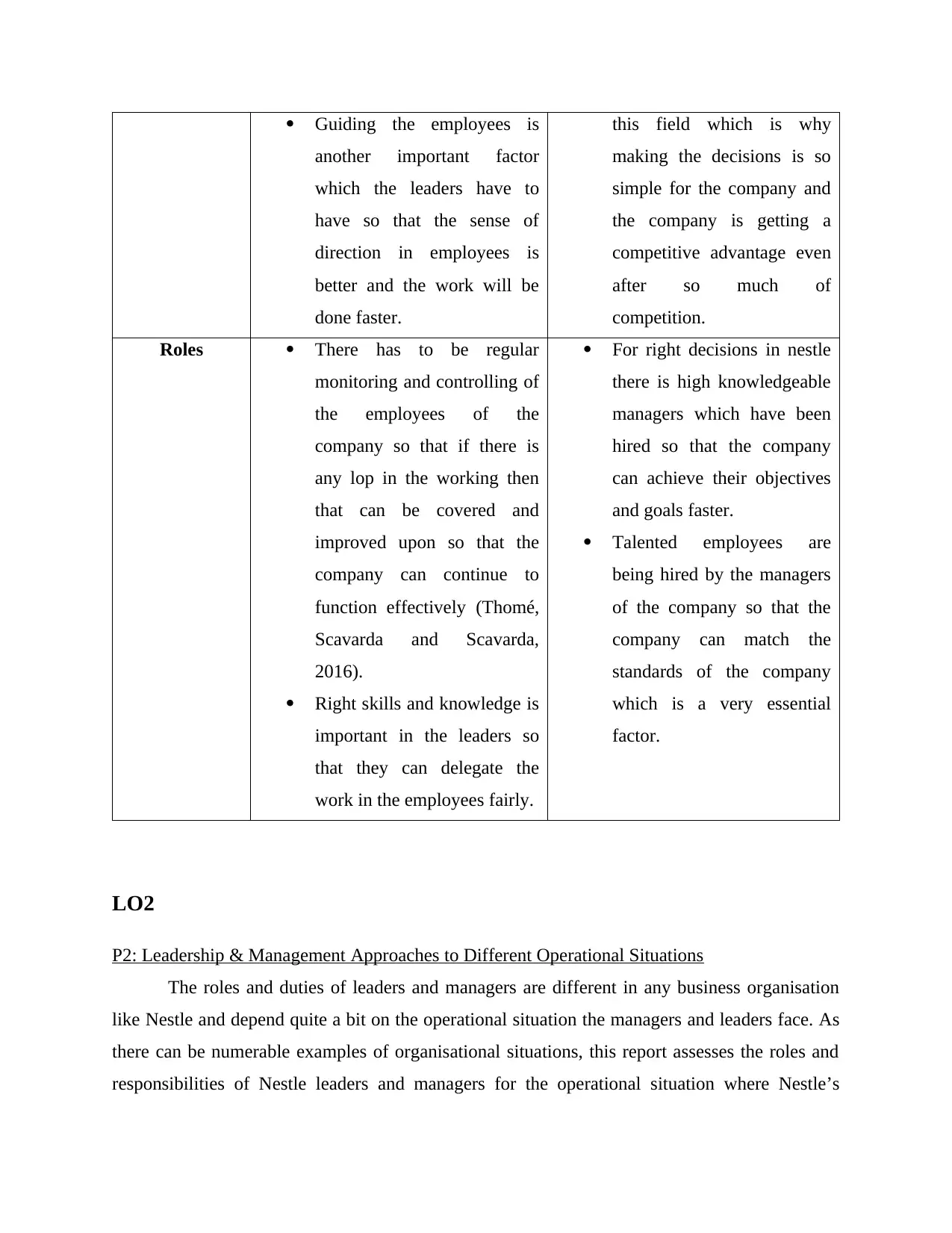
Guiding the employees is
another important factor
which the leaders have to
have so that the sense of
direction in employees is
better and the work will be
done faster.
this field which is why
making the decisions is so
simple for the company and
the company is getting a
competitive advantage even
after so much of
competition.
Roles There has to be regular
monitoring and controlling of
the employees of the
company so that if there is
any lop in the working then
that can be covered and
improved upon so that the
company can continue to
function effectively (Thomé,
Scavarda and Scavarda,
2016).
Right skills and knowledge is
important in the leaders so
that they can delegate the
work in the employees fairly.
For right decisions in nestle
there is high knowledgeable
managers which have been
hired so that the company
can achieve their objectives
and goals faster.
Talented employees are
being hired by the managers
of the company so that the
company can match the
standards of the company
which is a very essential
factor.
LO2
P2: Leadership & Management Approaches to Different Operational Situations
The roles and duties of leaders and managers are different in any business organisation
like Nestle and depend quite a bit on the operational situation the managers and leaders face. As
there can be numerable examples of organisational situations, this report assesses the roles and
responsibilities of Nestle leaders and managers for the operational situation where Nestle’s
another important factor
which the leaders have to
have so that the sense of
direction in employees is
better and the work will be
done faster.
this field which is why
making the decisions is so
simple for the company and
the company is getting a
competitive advantage even
after so much of
competition.
Roles There has to be regular
monitoring and controlling of
the employees of the
company so that if there is
any lop in the working then
that can be covered and
improved upon so that the
company can continue to
function effectively (Thomé,
Scavarda and Scavarda,
2016).
Right skills and knowledge is
important in the leaders so
that they can delegate the
work in the employees fairly.
For right decisions in nestle
there is high knowledgeable
managers which have been
hired so that the company
can achieve their objectives
and goals faster.
Talented employees are
being hired by the managers
of the company so that the
company can match the
standards of the company
which is a very essential
factor.
LO2
P2: Leadership & Management Approaches to Different Operational Situations
The roles and duties of leaders and managers are different in any business organisation
like Nestle and depend quite a bit on the operational situation the managers and leaders face. As
there can be numerable examples of organisational situations, this report assesses the roles and
responsibilities of Nestle leaders and managers for the operational situation where Nestle’s
Paraphrase This Document
Need a fresh take? Get an instant paraphrase of this document with our AI Paraphraser
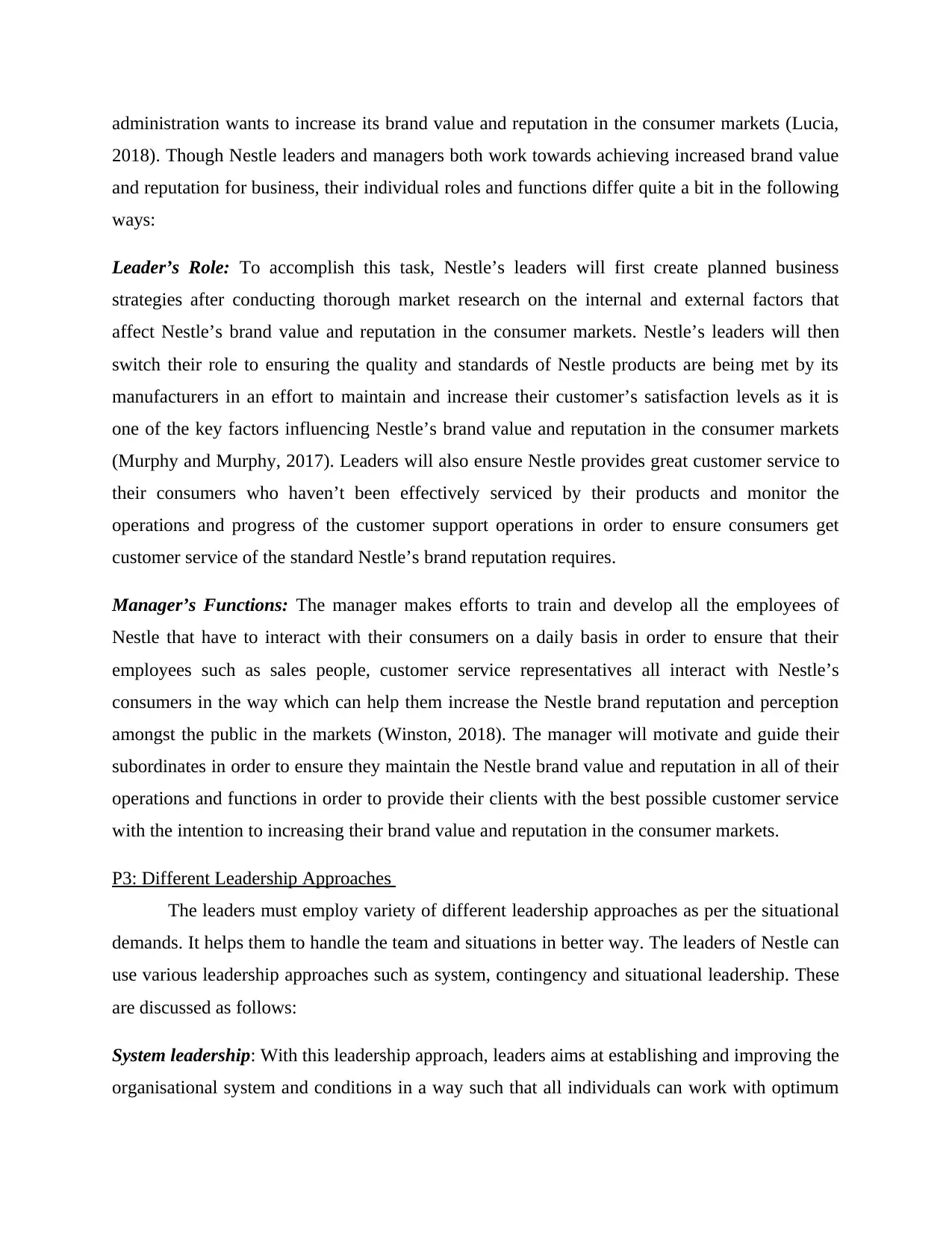
administration wants to increase its brand value and reputation in the consumer markets (Lucia,
2018). Though Nestle leaders and managers both work towards achieving increased brand value
and reputation for business, their individual roles and functions differ quite a bit in the following
ways:
Leader’s Role: To accomplish this task, Nestle’s leaders will first create planned business
strategies after conducting thorough market research on the internal and external factors that
affect Nestle’s brand value and reputation in the consumer markets. Nestle’s leaders will then
switch their role to ensuring the quality and standards of Nestle products are being met by its
manufacturers in an effort to maintain and increase their customer’s satisfaction levels as it is
one of the key factors influencing Nestle’s brand value and reputation in the consumer markets
(Murphy and Murphy, 2017). Leaders will also ensure Nestle provides great customer service to
their consumers who haven’t been effectively serviced by their products and monitor the
operations and progress of the customer support operations in order to ensure consumers get
customer service of the standard Nestle’s brand reputation requires.
Manager’s Functions: The manager makes efforts to train and develop all the employees of
Nestle that have to interact with their consumers on a daily basis in order to ensure that their
employees such as sales people, customer service representatives all interact with Nestle’s
consumers in the way which can help them increase the Nestle brand reputation and perception
amongst the public in the markets (Winston, 2018). The manager will motivate and guide their
subordinates in order to ensure they maintain the Nestle brand value and reputation in all of their
operations and functions in order to provide their clients with the best possible customer service
with the intention to increasing their brand value and reputation in the consumer markets.
P3: Different Leadership Approaches
The leaders must employ variety of different leadership approaches as per the situational
demands. It helps them to handle the team and situations in better way. The leaders of Nestle can
use various leadership approaches such as system, contingency and situational leadership. These
are discussed as follows:
System leadership: With this leadership approach, leaders aims at establishing and improving the
organisational system and conditions in a way such that all individuals can work with optimum
2018). Though Nestle leaders and managers both work towards achieving increased brand value
and reputation for business, their individual roles and functions differ quite a bit in the following
ways:
Leader’s Role: To accomplish this task, Nestle’s leaders will first create planned business
strategies after conducting thorough market research on the internal and external factors that
affect Nestle’s brand value and reputation in the consumer markets. Nestle’s leaders will then
switch their role to ensuring the quality and standards of Nestle products are being met by its
manufacturers in an effort to maintain and increase their customer’s satisfaction levels as it is
one of the key factors influencing Nestle’s brand value and reputation in the consumer markets
(Murphy and Murphy, 2017). Leaders will also ensure Nestle provides great customer service to
their consumers who haven’t been effectively serviced by their products and monitor the
operations and progress of the customer support operations in order to ensure consumers get
customer service of the standard Nestle’s brand reputation requires.
Manager’s Functions: The manager makes efforts to train and develop all the employees of
Nestle that have to interact with their consumers on a daily basis in order to ensure that their
employees such as sales people, customer service representatives all interact with Nestle’s
consumers in the way which can help them increase the Nestle brand reputation and perception
amongst the public in the markets (Winston, 2018). The manager will motivate and guide their
subordinates in order to ensure they maintain the Nestle brand value and reputation in all of their
operations and functions in order to provide their clients with the best possible customer service
with the intention to increasing their brand value and reputation in the consumer markets.
P3: Different Leadership Approaches
The leaders must employ variety of different leadership approaches as per the situational
demands. It helps them to handle the team and situations in better way. The leaders of Nestle can
use various leadership approaches such as system, contingency and situational leadership. These
are discussed as follows:
System leadership: With this leadership approach, leaders aims at establishing and improving the
organisational system and conditions in a way such that all individuals can work with optimum
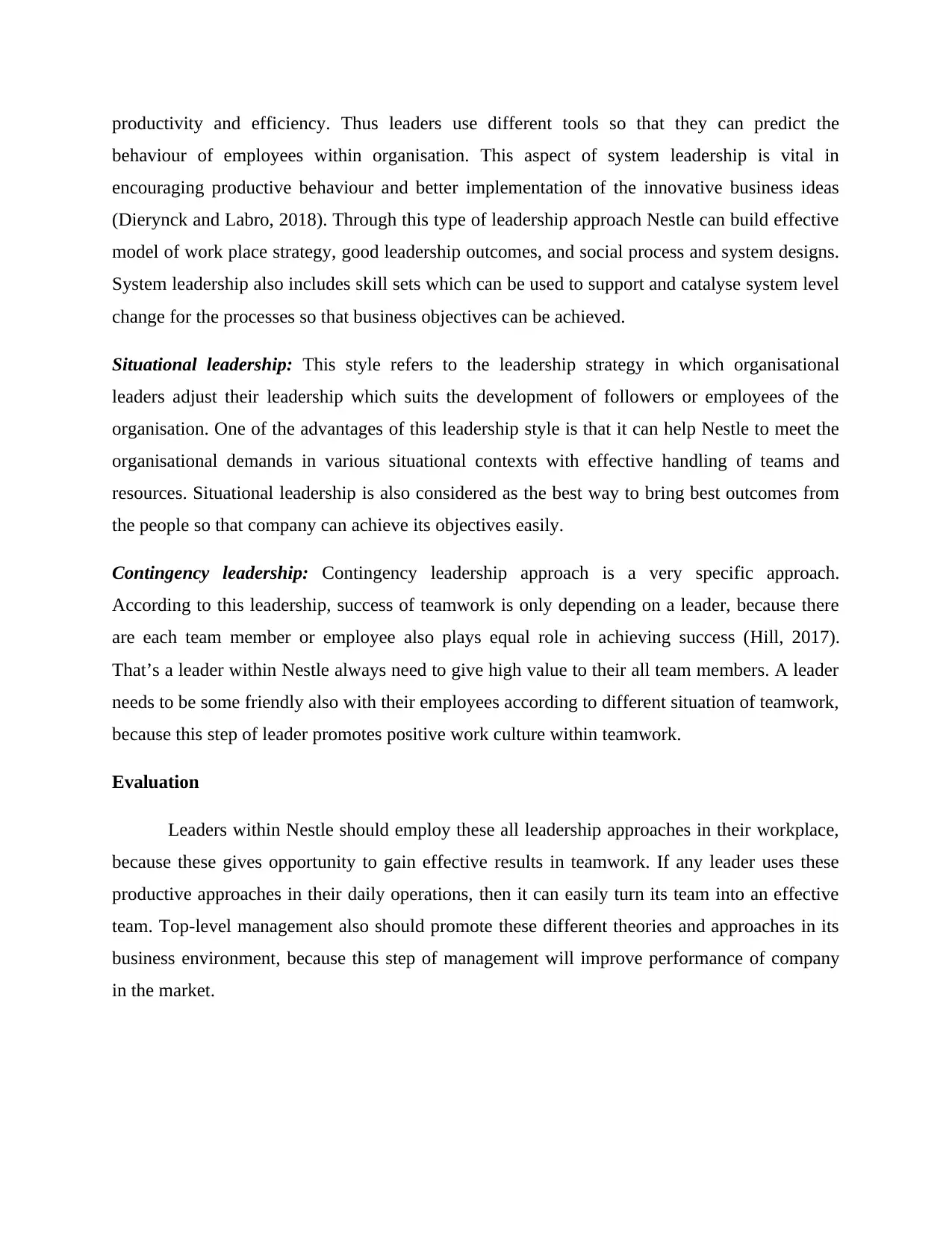
productivity and efficiency. Thus leaders use different tools so that they can predict the
behaviour of employees within organisation. This aspect of system leadership is vital in
encouraging productive behaviour and better implementation of the innovative business ideas
(Dierynck and Labro, 2018). Through this type of leadership approach Nestle can build effective
model of work place strategy, good leadership outcomes, and social process and system designs.
System leadership also includes skill sets which can be used to support and catalyse system level
change for the processes so that business objectives can be achieved.
Situational leadership: This style refers to the leadership strategy in which organisational
leaders adjust their leadership which suits the development of followers or employees of the
organisation. One of the advantages of this leadership style is that it can help Nestle to meet the
organisational demands in various situational contexts with effective handling of teams and
resources. Situational leadership is also considered as the best way to bring best outcomes from
the people so that company can achieve its objectives easily.
Contingency leadership: Contingency leadership approach is a very specific approach.
According to this leadership, success of teamwork is only depending on a leader, because there
are each team member or employee also plays equal role in achieving success (Hill, 2017).
That’s a leader within Nestle always need to give high value to their all team members. A leader
needs to be some friendly also with their employees according to different situation of teamwork,
because this step of leader promotes positive work culture within teamwork.
Evaluation
Leaders within Nestle should employ these all leadership approaches in their workplace,
because these gives opportunity to gain effective results in teamwork. If any leader uses these
productive approaches in their daily operations, then it can easily turn its team into an effective
team. Top-level management also should promote these different theories and approaches in its
business environment, because this step of management will improve performance of company
in the market.
behaviour of employees within organisation. This aspect of system leadership is vital in
encouraging productive behaviour and better implementation of the innovative business ideas
(Dierynck and Labro, 2018). Through this type of leadership approach Nestle can build effective
model of work place strategy, good leadership outcomes, and social process and system designs.
System leadership also includes skill sets which can be used to support and catalyse system level
change for the processes so that business objectives can be achieved.
Situational leadership: This style refers to the leadership strategy in which organisational
leaders adjust their leadership which suits the development of followers or employees of the
organisation. One of the advantages of this leadership style is that it can help Nestle to meet the
organisational demands in various situational contexts with effective handling of teams and
resources. Situational leadership is also considered as the best way to bring best outcomes from
the people so that company can achieve its objectives easily.
Contingency leadership: Contingency leadership approach is a very specific approach.
According to this leadership, success of teamwork is only depending on a leader, because there
are each team member or employee also plays equal role in achieving success (Hill, 2017).
That’s a leader within Nestle always need to give high value to their all team members. A leader
needs to be some friendly also with their employees according to different situation of teamwork,
because this step of leader promotes positive work culture within teamwork.
Evaluation
Leaders within Nestle should employ these all leadership approaches in their workplace,
because these gives opportunity to gain effective results in teamwork. If any leader uses these
productive approaches in their daily operations, then it can easily turn its team into an effective
team. Top-level management also should promote these different theories and approaches in its
business environment, because this step of management will improve performance of company
in the market.
⊘ This is a preview!⊘
Do you want full access?
Subscribe today to unlock all pages.

Trusted by 1+ million students worldwide
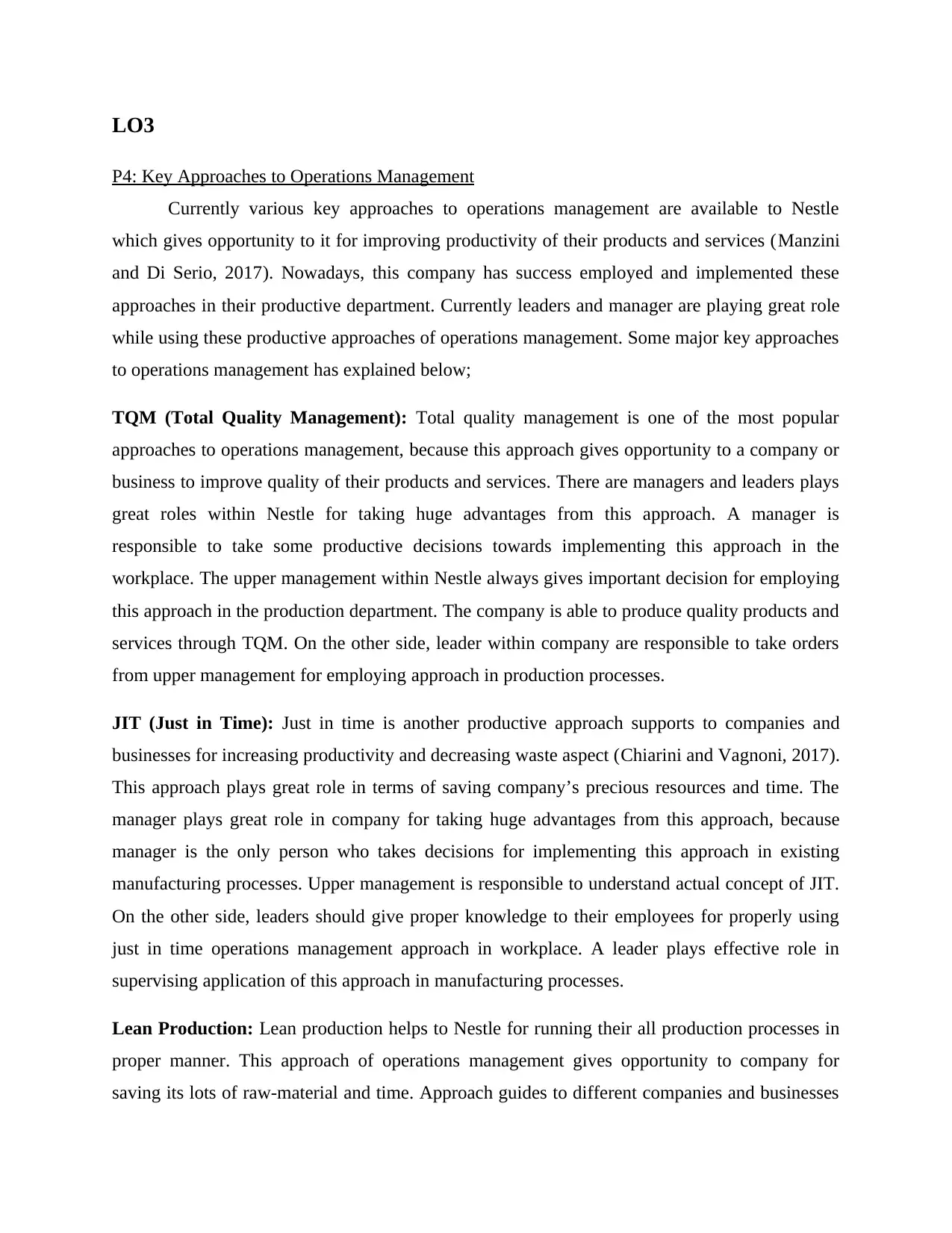
LO3
P4: Key Approaches to Operations Management
Currently various key approaches to operations management are available to Nestle
which gives opportunity to it for improving productivity of their products and services (Manzini
and Di Serio, 2017). Nowadays, this company has success employed and implemented these
approaches in their productive department. Currently leaders and manager are playing great role
while using these productive approaches of operations management. Some major key approaches
to operations management has explained below;
TQM (Total Quality Management): Total quality management is one of the most popular
approaches to operations management, because this approach gives opportunity to a company or
business to improve quality of their products and services. There are managers and leaders plays
great roles within Nestle for taking huge advantages from this approach. A manager is
responsible to take some productive decisions towards implementing this approach in the
workplace. The upper management within Nestle always gives important decision for employing
this approach in the production department. The company is able to produce quality products and
services through TQM. On the other side, leader within company are responsible to take orders
from upper management for employing approach in production processes.
JIT (Just in Time): Just in time is another productive approach supports to companies and
businesses for increasing productivity and decreasing waste aspect (Chiarini and Vagnoni, 2017).
This approach plays great role in terms of saving company’s precious resources and time. The
manager plays great role in company for taking huge advantages from this approach, because
manager is the only person who takes decisions for implementing this approach in existing
manufacturing processes. Upper management is responsible to understand actual concept of JIT.
On the other side, leaders should give proper knowledge to their employees for properly using
just in time operations management approach in workplace. A leader plays effective role in
supervising application of this approach in manufacturing processes.
Lean Production: Lean production helps to Nestle for running their all production processes in
proper manner. This approach of operations management gives opportunity to company for
saving its lots of raw-material and time. Approach guides to different companies and businesses
P4: Key Approaches to Operations Management
Currently various key approaches to operations management are available to Nestle
which gives opportunity to it for improving productivity of their products and services (Manzini
and Di Serio, 2017). Nowadays, this company has success employed and implemented these
approaches in their productive department. Currently leaders and manager are playing great role
while using these productive approaches of operations management. Some major key approaches
to operations management has explained below;
TQM (Total Quality Management): Total quality management is one of the most popular
approaches to operations management, because this approach gives opportunity to a company or
business to improve quality of their products and services. There are managers and leaders plays
great roles within Nestle for taking huge advantages from this approach. A manager is
responsible to take some productive decisions towards implementing this approach in the
workplace. The upper management within Nestle always gives important decision for employing
this approach in the production department. The company is able to produce quality products and
services through TQM. On the other side, leader within company are responsible to take orders
from upper management for employing approach in production processes.
JIT (Just in Time): Just in time is another productive approach supports to companies and
businesses for increasing productivity and decreasing waste aspect (Chiarini and Vagnoni, 2017).
This approach plays great role in terms of saving company’s precious resources and time. The
manager plays great role in company for taking huge advantages from this approach, because
manager is the only person who takes decisions for implementing this approach in existing
manufacturing processes. Upper management is responsible to understand actual concept of JIT.
On the other side, leaders should give proper knowledge to their employees for properly using
just in time operations management approach in workplace. A leader plays effective role in
supervising application of this approach in manufacturing processes.
Lean Production: Lean production helps to Nestle for running their all production processes in
proper manner. This approach of operations management gives opportunity to company for
saving its lots of raw-material and time. Approach guides to different companies and businesses
Paraphrase This Document
Need a fresh take? Get an instant paraphrase of this document with our AI Paraphraser
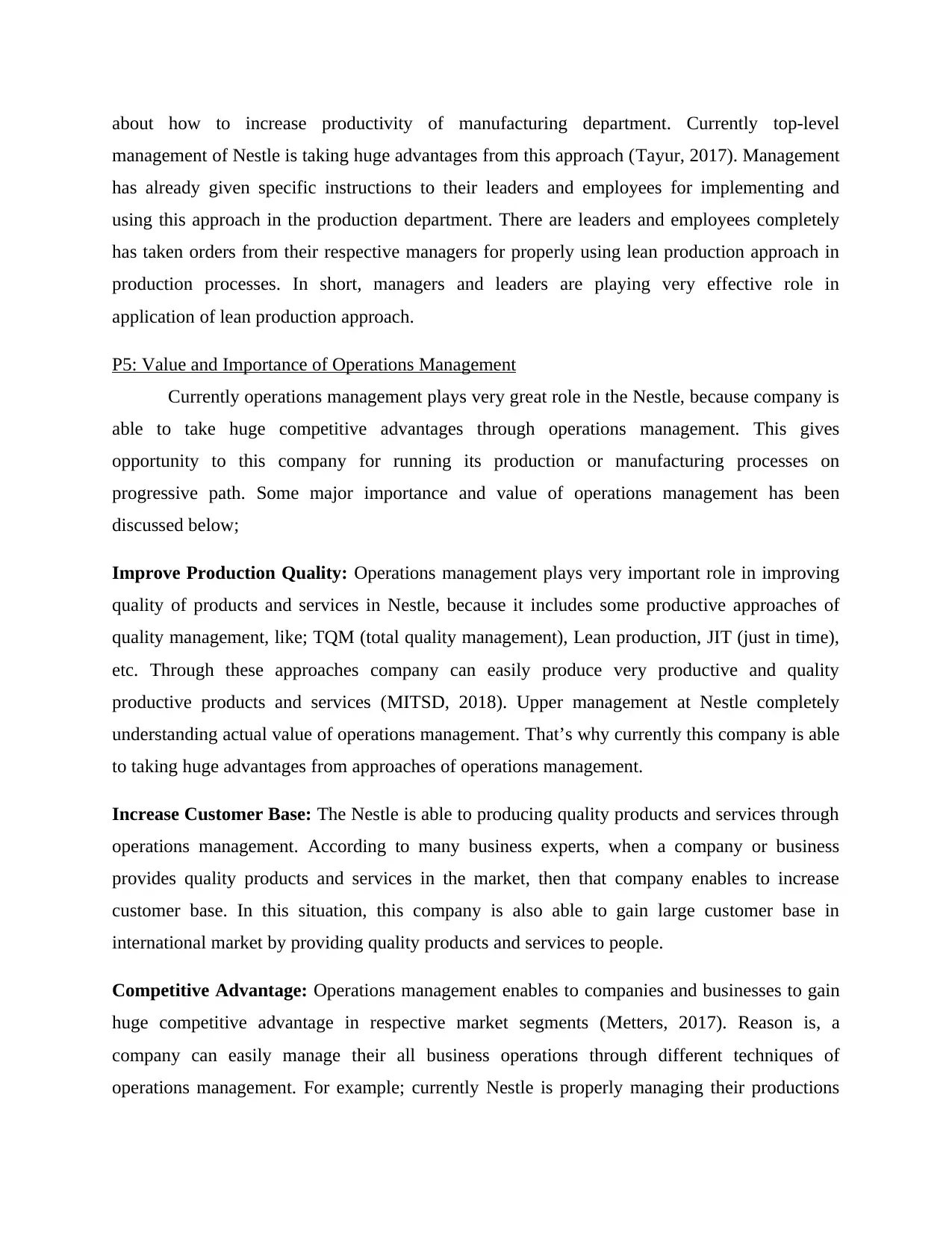
about how to increase productivity of manufacturing department. Currently top-level
management of Nestle is taking huge advantages from this approach (Tayur, 2017). Management
has already given specific instructions to their leaders and employees for implementing and
using this approach in the production department. There are leaders and employees completely
has taken orders from their respective managers for properly using lean production approach in
production processes. In short, managers and leaders are playing very effective role in
application of lean production approach.
P5: Value and Importance of Operations Management
Currently operations management plays very great role in the Nestle, because company is
able to take huge competitive advantages through operations management. This gives
opportunity to this company for running its production or manufacturing processes on
progressive path. Some major importance and value of operations management has been
discussed below;
Improve Production Quality: Operations management plays very important role in improving
quality of products and services in Nestle, because it includes some productive approaches of
quality management, like; TQM (total quality management), Lean production, JIT (just in time),
etc. Through these approaches company can easily produce very productive and quality
productive products and services (MITSD, 2018). Upper management at Nestle completely
understanding actual value of operations management. That’s why currently this company is able
to taking huge advantages from approaches of operations management.
Increase Customer Base: The Nestle is able to producing quality products and services through
operations management. According to many business experts, when a company or business
provides quality products and services in the market, then that company enables to increase
customer base. In this situation, this company is also able to gain large customer base in
international market by providing quality products and services to people.
Competitive Advantage: Operations management enables to companies and businesses to gain
huge competitive advantage in respective market segments (Metters, 2017). Reason is, a
company can easily manage their all business operations through different techniques of
operations management. For example; currently Nestle is properly managing their productions
management of Nestle is taking huge advantages from this approach (Tayur, 2017). Management
has already given specific instructions to their leaders and employees for implementing and
using this approach in the production department. There are leaders and employees completely
has taken orders from their respective managers for properly using lean production approach in
production processes. In short, managers and leaders are playing very effective role in
application of lean production approach.
P5: Value and Importance of Operations Management
Currently operations management plays very great role in the Nestle, because company is
able to take huge competitive advantages through operations management. This gives
opportunity to this company for running its production or manufacturing processes on
progressive path. Some major importance and value of operations management has been
discussed below;
Improve Production Quality: Operations management plays very important role in improving
quality of products and services in Nestle, because it includes some productive approaches of
quality management, like; TQM (total quality management), Lean production, JIT (just in time),
etc. Through these approaches company can easily produce very productive and quality
productive products and services (MITSD, 2018). Upper management at Nestle completely
understanding actual value of operations management. That’s why currently this company is able
to taking huge advantages from approaches of operations management.
Increase Customer Base: The Nestle is able to producing quality products and services through
operations management. According to many business experts, when a company or business
provides quality products and services in the market, then that company enables to increase
customer base. In this situation, this company is also able to gain large customer base in
international market by providing quality products and services to people.
Competitive Advantage: Operations management enables to companies and businesses to gain
huge competitive advantage in respective market segments (Metters, 2017). Reason is, a
company can easily manage their all business operations through different techniques of
operations management. For example; currently Nestle is properly managing their productions
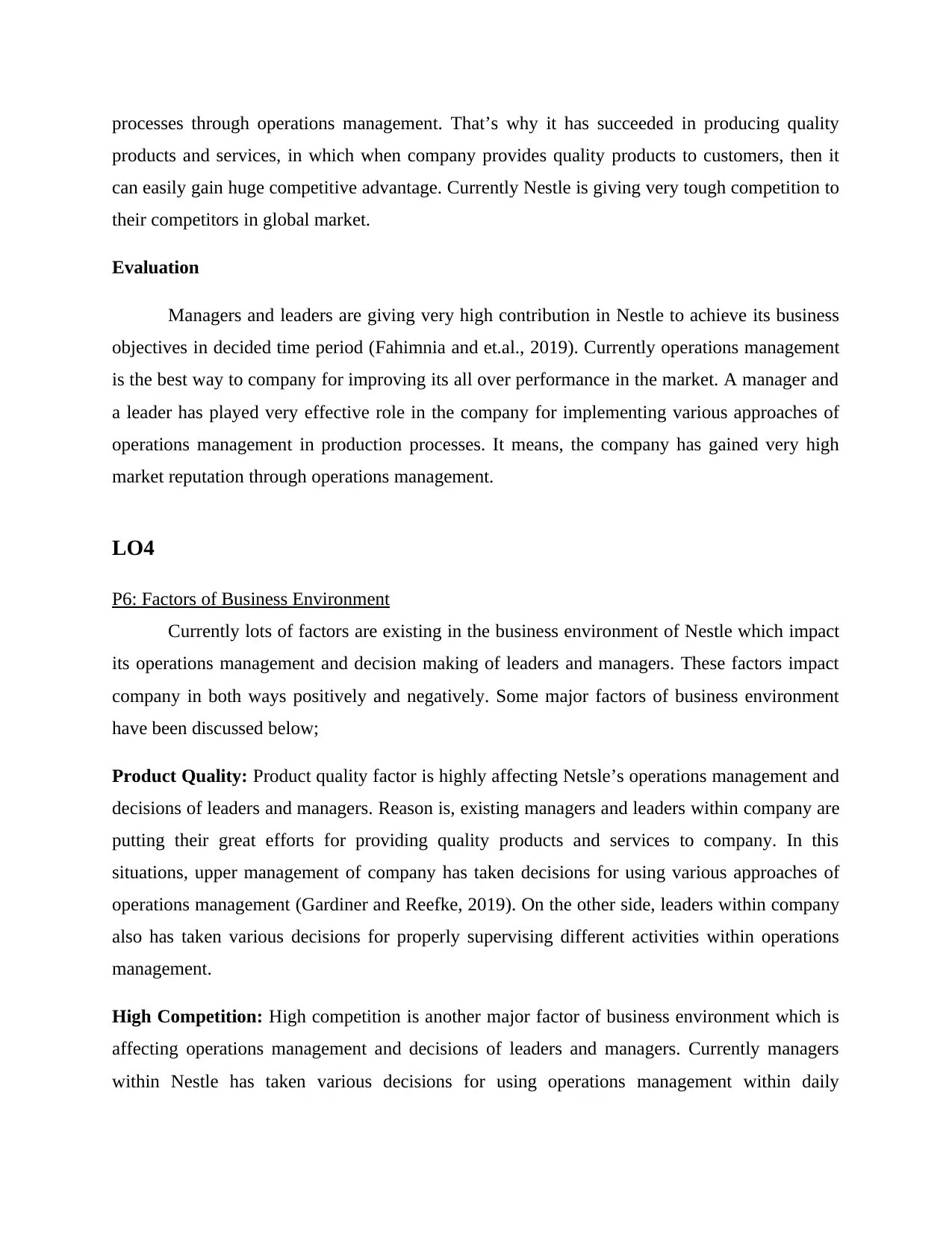
processes through operations management. That’s why it has succeeded in producing quality
products and services, in which when company provides quality products to customers, then it
can easily gain huge competitive advantage. Currently Nestle is giving very tough competition to
their competitors in global market.
Evaluation
Managers and leaders are giving very high contribution in Nestle to achieve its business
objectives in decided time period (Fahimnia and et.al., 2019). Currently operations management
is the best way to company for improving its all over performance in the market. A manager and
a leader has played very effective role in the company for implementing various approaches of
operations management in production processes. It means, the company has gained very high
market reputation through operations management.
LO4
P6: Factors of Business Environment
Currently lots of factors are existing in the business environment of Nestle which impact
its operations management and decision making of leaders and managers. These factors impact
company in both ways positively and negatively. Some major factors of business environment
have been discussed below;
Product Quality: Product quality factor is highly affecting Netsle’s operations management and
decisions of leaders and managers. Reason is, existing managers and leaders within company are
putting their great efforts for providing quality products and services to company. In this
situations, upper management of company has taken decisions for using various approaches of
operations management (Gardiner and Reefke, 2019). On the other side, leaders within company
also has taken various decisions for properly supervising different activities within operations
management.
High Competition: High competition is another major factor of business environment which is
affecting operations management and decisions of leaders and managers. Currently managers
within Nestle has taken various decisions for using operations management within daily
products and services, in which when company provides quality products to customers, then it
can easily gain huge competitive advantage. Currently Nestle is giving very tough competition to
their competitors in global market.
Evaluation
Managers and leaders are giving very high contribution in Nestle to achieve its business
objectives in decided time period (Fahimnia and et.al., 2019). Currently operations management
is the best way to company for improving its all over performance in the market. A manager and
a leader has played very effective role in the company for implementing various approaches of
operations management in production processes. It means, the company has gained very high
market reputation through operations management.
LO4
P6: Factors of Business Environment
Currently lots of factors are existing in the business environment of Nestle which impact
its operations management and decision making of leaders and managers. These factors impact
company in both ways positively and negatively. Some major factors of business environment
have been discussed below;
Product Quality: Product quality factor is highly affecting Netsle’s operations management and
decisions of leaders and managers. Reason is, existing managers and leaders within company are
putting their great efforts for providing quality products and services to company. In this
situations, upper management of company has taken decisions for using various approaches of
operations management (Gardiner and Reefke, 2019). On the other side, leaders within company
also has taken various decisions for properly supervising different activities within operations
management.
High Competition: High competition is another major factor of business environment which is
affecting operations management and decisions of leaders and managers. Currently managers
within Nestle has taken various decisions for using operations management within daily
⊘ This is a preview!⊘
Do you want full access?
Subscribe today to unlock all pages.

Trusted by 1+ million students worldwide
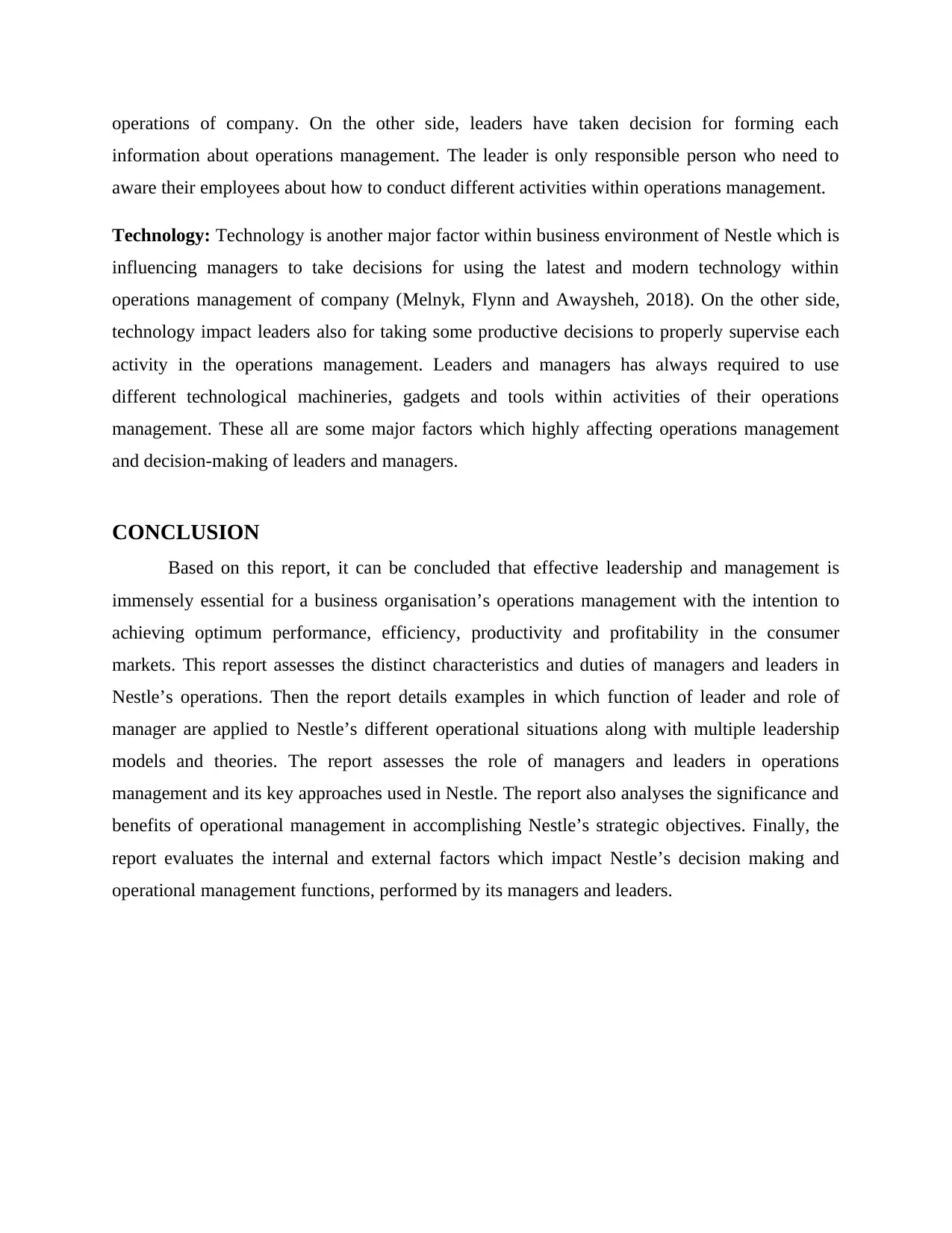
operations of company. On the other side, leaders have taken decision for forming each
information about operations management. The leader is only responsible person who need to
aware their employees about how to conduct different activities within operations management.
Technology: Technology is another major factor within business environment of Nestle which is
influencing managers to take decisions for using the latest and modern technology within
operations management of company (Melnyk, Flynn and Awaysheh, 2018). On the other side,
technology impact leaders also for taking some productive decisions to properly supervise each
activity in the operations management. Leaders and managers has always required to use
different technological machineries, gadgets and tools within activities of their operations
management. These all are some major factors which highly affecting operations management
and decision-making of leaders and managers.
CONCLUSION
Based on this report, it can be concluded that effective leadership and management is
immensely essential for a business organisation’s operations management with the intention to
achieving optimum performance, efficiency, productivity and profitability in the consumer
markets. This report assesses the distinct characteristics and duties of managers and leaders in
Nestle’s operations. Then the report details examples in which function of leader and role of
manager are applied to Nestle’s different operational situations along with multiple leadership
models and theories. The report assesses the role of managers and leaders in operations
management and its key approaches used in Nestle. The report also analyses the significance and
benefits of operational management in accomplishing Nestle’s strategic objectives. Finally, the
report evaluates the internal and external factors which impact Nestle’s decision making and
operational management functions, performed by its managers and leaders.
information about operations management. The leader is only responsible person who need to
aware their employees about how to conduct different activities within operations management.
Technology: Technology is another major factor within business environment of Nestle which is
influencing managers to take decisions for using the latest and modern technology within
operations management of company (Melnyk, Flynn and Awaysheh, 2018). On the other side,
technology impact leaders also for taking some productive decisions to properly supervise each
activity in the operations management. Leaders and managers has always required to use
different technological machineries, gadgets and tools within activities of their operations
management. These all are some major factors which highly affecting operations management
and decision-making of leaders and managers.
CONCLUSION
Based on this report, it can be concluded that effective leadership and management is
immensely essential for a business organisation’s operations management with the intention to
achieving optimum performance, efficiency, productivity and profitability in the consumer
markets. This report assesses the distinct characteristics and duties of managers and leaders in
Nestle’s operations. Then the report details examples in which function of leader and role of
manager are applied to Nestle’s different operational situations along with multiple leadership
models and theories. The report assesses the role of managers and leaders in operations
management and its key approaches used in Nestle. The report also analyses the significance and
benefits of operational management in accomplishing Nestle’s strategic objectives. Finally, the
report evaluates the internal and external factors which impact Nestle’s decision making and
operational management functions, performed by its managers and leaders.
Paraphrase This Document
Need a fresh take? Get an instant paraphrase of this document with our AI Paraphraser
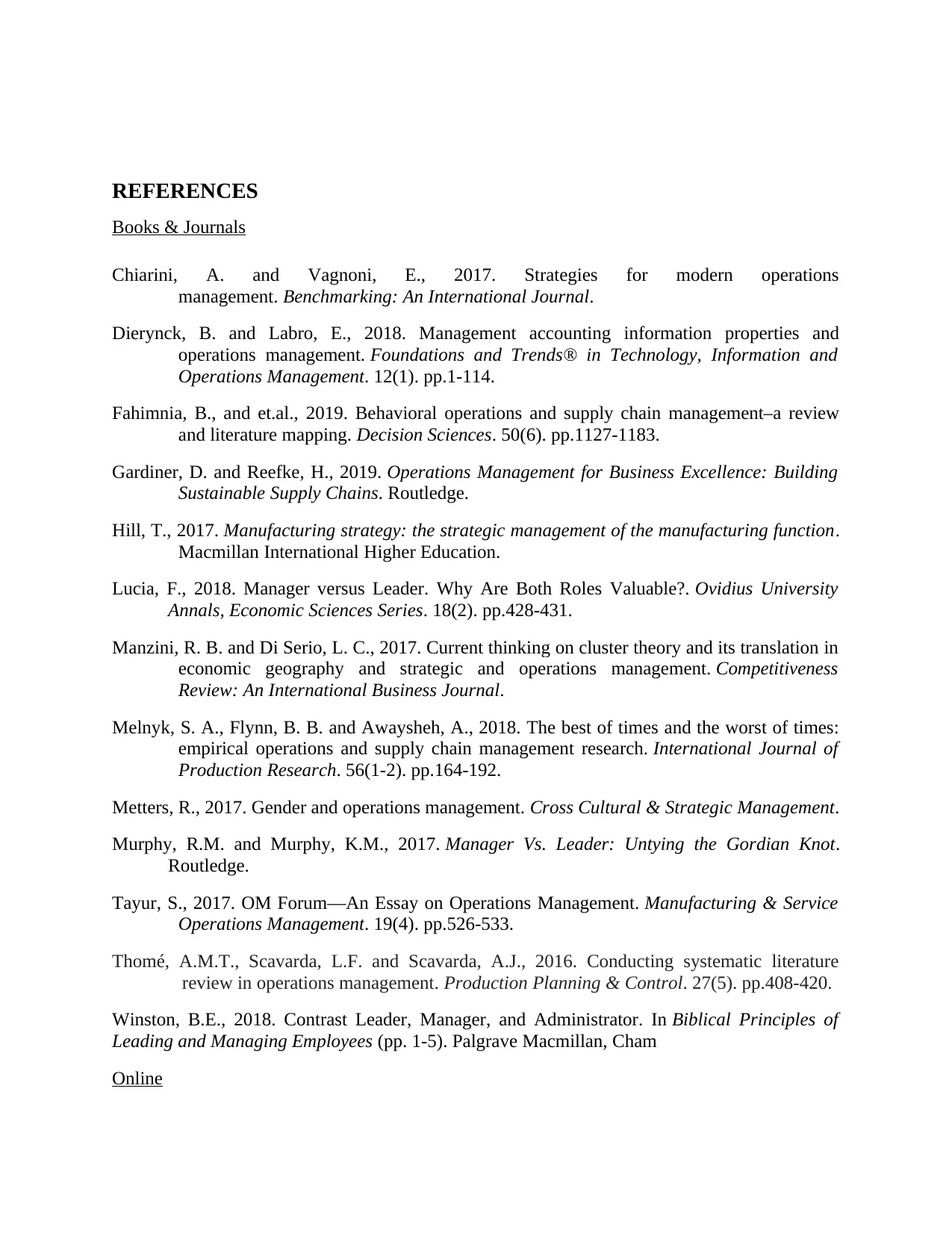
REFERENCES
Books & Journals
Chiarini, A. and Vagnoni, E., 2017. Strategies for modern operations
management. Benchmarking: An International Journal.
Dierynck, B. and Labro, E., 2018. Management accounting information properties and
operations management. Foundations and Trends® in Technology, Information and
Operations Management. 12(1). pp.1-114.
Fahimnia, B., and et.al., 2019. Behavioral operations and supply chain management–a review
and literature mapping. Decision Sciences. 50(6). pp.1127-1183.
Gardiner, D. and Reefke, H., 2019. Operations Management for Business Excellence: Building
Sustainable Supply Chains. Routledge.
Hill, T., 2017. Manufacturing strategy: the strategic management of the manufacturing function.
Macmillan International Higher Education.
Lucia, F., 2018. Manager versus Leader. Why Are Both Roles Valuable?. Ovidius University
Annals, Economic Sciences Series. 18(2). pp.428-431.
Manzini, R. B. and Di Serio, L. C., 2017. Current thinking on cluster theory and its translation in
economic geography and strategic and operations management. Competitiveness
Review: An International Business Journal.
Melnyk, S. A., Flynn, B. B. and Awaysheh, A., 2018. The best of times and the worst of times:
empirical operations and supply chain management research. International Journal of
Production Research. 56(1-2). pp.164-192.
Metters, R., 2017. Gender and operations management. Cross Cultural & Strategic Management.
Murphy, R.M. and Murphy, K.M., 2017. Manager Vs. Leader: Untying the Gordian Knot.
Routledge.
Tayur, S., 2017. OM Forum—An Essay on Operations Management. Manufacturing & Service
Operations Management. 19(4). pp.526-533.
Thomé, A.M.T., Scavarda, L.F. and Scavarda, A.J., 2016. Conducting systematic literature
review in operations management. Production Planning & Control. 27(5). pp.408-420.
Winston, B.E., 2018. Contrast Leader, Manager, and Administrator. In Biblical Principles of
Leading and Managing Employees (pp. 1-5). Palgrave Macmillan, Cham
Online
Books & Journals
Chiarini, A. and Vagnoni, E., 2017. Strategies for modern operations
management. Benchmarking: An International Journal.
Dierynck, B. and Labro, E., 2018. Management accounting information properties and
operations management. Foundations and Trends® in Technology, Information and
Operations Management. 12(1). pp.1-114.
Fahimnia, B., and et.al., 2019. Behavioral operations and supply chain management–a review
and literature mapping. Decision Sciences. 50(6). pp.1127-1183.
Gardiner, D. and Reefke, H., 2019. Operations Management for Business Excellence: Building
Sustainable Supply Chains. Routledge.
Hill, T., 2017. Manufacturing strategy: the strategic management of the manufacturing function.
Macmillan International Higher Education.
Lucia, F., 2018. Manager versus Leader. Why Are Both Roles Valuable?. Ovidius University
Annals, Economic Sciences Series. 18(2). pp.428-431.
Manzini, R. B. and Di Serio, L. C., 2017. Current thinking on cluster theory and its translation in
economic geography and strategic and operations management. Competitiveness
Review: An International Business Journal.
Melnyk, S. A., Flynn, B. B. and Awaysheh, A., 2018. The best of times and the worst of times:
empirical operations and supply chain management research. International Journal of
Production Research. 56(1-2). pp.164-192.
Metters, R., 2017. Gender and operations management. Cross Cultural & Strategic Management.
Murphy, R.M. and Murphy, K.M., 2017. Manager Vs. Leader: Untying the Gordian Knot.
Routledge.
Tayur, S., 2017. OM Forum—An Essay on Operations Management. Manufacturing & Service
Operations Management. 19(4). pp.526-533.
Thomé, A.M.T., Scavarda, L.F. and Scavarda, A.J., 2016. Conducting systematic literature
review in operations management. Production Planning & Control. 27(5). pp.408-420.
Winston, B.E., 2018. Contrast Leader, Manager, and Administrator. In Biblical Principles of
Leading and Managing Employees (pp. 1-5). Palgrave Macmillan, Cham
Online

MITSDE, 2018. Importance of operations management. [Online]. Available Through:
<https://blog.mitsde.com/importance-of-operations-management/>.
<https://blog.mitsde.com/importance-of-operations-management/>.
⊘ This is a preview!⊘
Do you want full access?
Subscribe today to unlock all pages.

Trusted by 1+ million students worldwide
1 out of 12
Related Documents
Your All-in-One AI-Powered Toolkit for Academic Success.
+13062052269
info@desklib.com
Available 24*7 on WhatsApp / Email
![[object Object]](/_next/static/media/star-bottom.7253800d.svg)
Unlock your academic potential
Copyright © 2020–2026 A2Z Services. All Rights Reserved. Developed and managed by ZUCOL.




